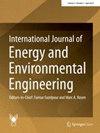Wind energy forecasting by fitting predicted probability density functions of wind speed measurements
IF 2.4
Q4 ENERGY & FUELS
International Journal of Energy and Environmental Engineering
Pub Date : 2022-02-18
DOI:10.1007/s40095-022-00475-8
引用次数: 1
通过拟合风速测量的预测概率密度函数来预测风能
本文章由计算机程序翻译,如有差异,请以英文原文为准。
求助全文
约1分钟内获得全文
求助全文
来源期刊

International Journal of Energy and Environmental Engineering
ENERGY & FUELS-
CiteScore
5.10
自引率
11.50%
发文量
92
期刊介绍:
The journal is open for submissions.The International Journal of Energy and Environmental Engineering (IJEEE) is a multi-disciplinary, peer-reviewed journal covering all areas of energy and environment related fields that apply to the science and engineering communities.IJEEE aims to promote rapid communication and dialogue among researchers, scientists, and engineers working in the areas of energy and environmental engineering. The journal provides a focus for activities concerning the development, assessment and management of energy and environmental engineering related programs. It is hoped that this journal will prove to be an important factor in raising the standards of discussion, analyses, and evaluations relating to energy and environment programs.The following are among the topical areas on which important contributions in energy engineering are solicited: Input-output analyses relating to energy-consuming systems, careful resource or reserve assessments of all types, energy conservation measures and their implementations, incisive evaluation of energy- system management, environmental- impact assessments, and policy alternatives stressing economic implications, bio- reactions and bio-engineering, geothermal energy, marine and hydroelectric energy, nuclear energy, solar energy, wind energy, energy conversion, energy efficient buildings, energy storage, power distribution, renewable energy resource assessment and transportation.The following areas represent some of the potential fields in which important contributions in environmental engineering are sought: design and development of engineering methods, management, governmental policies, and societal impacts of wastewater collection and treatment ; the fate and transport of contaminants on watersheds, in surface water, in groundwater, in soil, and in the atmosphere; environmental biology, microbiology, chemistry, fluid mechanics, and physical processes that control natural concentrations and dispersion of wastes in air, water, and soil; nonpoint-source pollution on watersheds, in streams, in groundwater, in lakes, and in estuaries and coastal areas; treatment, management, and control of hazardous wastes; control and monitoring of air pollution and acid deposition; airshed management; and design and management of solid waste facilities. A balanced contribution from consultants, practicing engineers, and researchers is sought on engineering solutions, and professional obligations and responsibilities.All manuscripts with significant research results in the areas of energy and environment and their application are welcome.
 求助内容:
求助内容: 应助结果提醒方式:
应助结果提醒方式:


